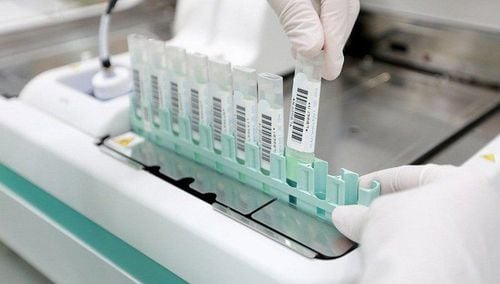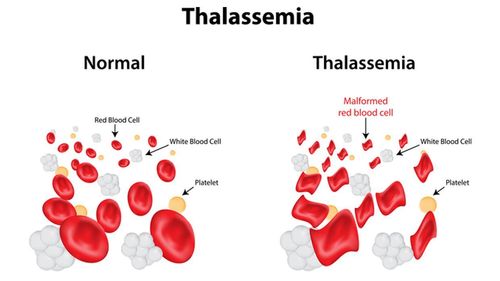This is an automatically translated article.
Genetic tests are tests that have the ability to analyze genes that cause inherited diseases or determine relationships, origins in blood relationships. Therefore, genetic testing plays a huge role in providing information related to human genes as well as chromosomes in many different areas of medicine.
1. Genetic testing

Xét nghiệm di truyền tìm đột biến hay bất thường về gen
Genetic testing is a method that tells us how an individual has received genes from its parents so that we can predict gene-related diseases. In clinical practice, blood or skin cell samples are often used to perform genetic testing for mutations or genetic abnormalities.
2. Types of Genetic Tests

Hiện nay có nhiều biện pháp xét nghiệm di truyền khác nhau
2.1 Newborn Screening A genetic test performed on newborns to look for treatable endocrine and metabolic diseases in the first few days of life. In Vietnam, the national newborn screening program is implemented with basic diseases such as congenital G6PD deficiency, congenital hypothyroidism, adrenal hyperplasia, 48 genetic disorders belonging to the following disease groups: metabolic disorders Acylcarnitine, Amino Acids, Hemoglobin and biochemical tests.
2.2 Diagnostic test Is a genetic test to analyze and treat genetic diseases related to chromosomes. In addition, this test is also used to diagnose genetic mutations, chromosome mutations and disease symptoms. This genetic test is done at any time in life and is not for all genes in the human body.
2.3 Carrier test A type of genetic test to check if an individual carries a copy of a mutated gene that causes genetic disorders, used in cases where couples or their families have a history of have genetic diseases or are more likely to have children with these genetic diseases.
2.4 Genetic diagnosis of implantation Is a genetic test that diagnoses abnormalities as well as finds the cause of abnormal embryos in the early embryonic stage of in vitro fertilization, before embryo implantation.
2.5 Genetic testing before pregnancy Genetic testing before pregnancy, also known as prenatal testing, is genetic testing done to find abnormalities in the genes of a fetus.
Pre-pregnancy genetic testing contributes to the decision whether to keep at-risk pregnancies. One limitation of this type of genetic test is that it cannot detect all possible genetic abnormalities and birth defects. There are two methods of genetic testing before pregnancy that are being used today: maternal serum screening test and non-invasive prenatal genetic testing called NIPT.
2.6 Predictive testing and pre-symptomatic testing Is a test used to find genetic mutations related to diseases that are likely to occur after birth and during life. This type of test helps detect and predict diseases in which family members of these individuals carry the disease gene. Diseases commonly detected by this test are Hemochromatosis, breast cancer ...
2.7 Pharmacogenomics Genetic testing is used to determine the effects of genetic variation on drug response.
2.8 Forensic DNA testing A genetic test used to examine the relationship of test participants for legal purposes, identifying criminals and victims in the legal field.
2.9 Parent-child testing A type of test that uses special DNA markers to determine the blood relationship between test participants.
2.10 Genealogical DNA test Used to determine the ancestry and genetics of racial groups.
Currently, Vinmec International General Hospital is the first medical facility in Vietnam capable of implementing all types of genetic testing.
Please dial HOTLINE for more information or register for an appointment HERE. Download MyVinmec app to make appointments faster and to manage your bookings easily.













